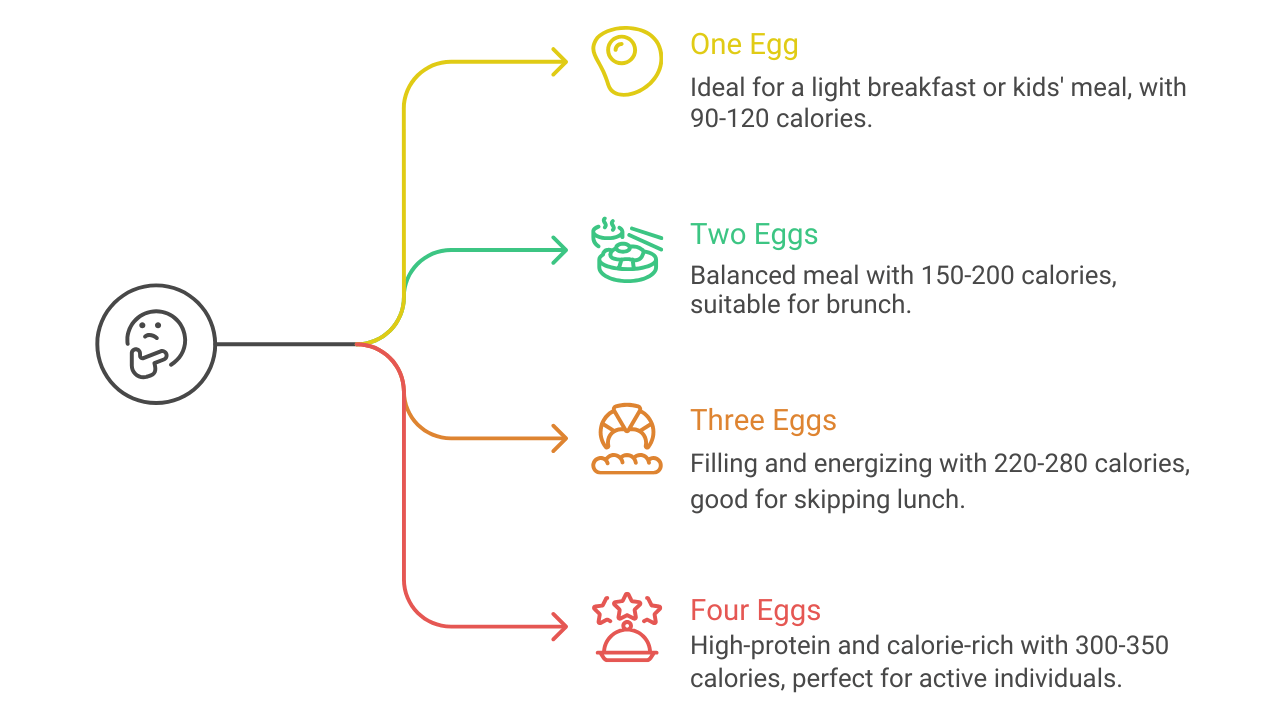How Many Calories Are in a Veggie Omelette with 1 to 4 Eggs?
If you enjoy a healthy breakfast or are trying to manage your daily calorie intake, you may have asked yourself: How many calories are in a veggie omelette? It is a great question, especially for anyone watching their weight or aiming to make healthier food choices in Cary, NC. Whether you are eating at home or visiting your favorite breakfast spot, knowing the calorie count in your meal can help you stay on track.
This article will explore the calorie content of veggie omelettes made with 1 to 4 eggs, along with other popular variations like egg whites and cheese. We will also answer common questions and help you choose the omelette to match your goals.
What Is a Veggie Omelette?
A veggie omelette is a popular breakfast made by whisking eggs and cooking them in a pan with vegetables such as onions, bell peppers, mushrooms, spinach, and tomatoes. Some people like to add cheese, while others prefer keeping it dairy-free. The combination is simple, but the result is both delicious and nutritious.
If you're wondering how to make a veggie omelette or want to try different recipe styles, check out our veggie omelette recipes guide on Pineapple Sol. We have created five delicious versions for every kind of breakfast lover.
Calorie Breakdown by Egg Count (1 to 4 Eggs)
One of the most significant factors in a veggie omelette’s calorie count is how many eggs you use. Other factors include how much oil is used in cooking, whether you add cheese, and the type of vegetables included. Here, we will focus on the egg count alone while assuming a small amount of oil and a moderate serving of veggies.
1. Egg Veggie Omelette Calories
If you go with a single egg veggie omelette, you are looking at 90 to 120 calories. The egg itself typically provides around 70 calories. When you add a small number of vegetables and a teaspoon of olive oil or butter to cook, the calorie count rises slightly. This omelette is excellent for a light breakfast or something to start your day. It is also ideal for kids or anyone who prefers a smaller meal. In Cary, NC, health-conscious diners often order one-egg omelettes with vegetables at breakfast cafes like Pineapple Sol, where we prioritize making healthy food that’s both satisfying and nutritious.
2. Egg Veggie Omelette Calories
A two-egg veggie omelette usually contains 150 to 200 calories. Two whole eggs provide roughly 140 calories, and the rest comes from the vegetables and cooking fat. It is a very balanced meal in terms of energy, especially if you are heading into a busy day. A 2-egg veggie omelette gives you a decent amount of protein, important vitamins, and fiber from the vegetables. It is a favorite for brunch-goers in Cary who want something filling but not heavy. At Pineapple Sol, we prepare two-egg veggie omelettes that taste homemade and fresh, using seasonal vegetables whenever possible.
3. Egg Veggie Omelette Calories
A three-egg veggie omelette packs about 220 to 280 calories, depending on your cooking method and toppings. Each egg adds about 70 calories, so three eggs alone give you 210 calories. The calorie count increases when you add a half-cup of vegetables and a tablespoon of oil. This size is often ordered by those with bigger appetites or people who are skipping lunch. Some prefer to add cheese, which we will talk about later. But even without cheese, a 3-egg veggie omelette is filling and energizing. It is also a high-protein meal that keeps you full longer, which is excellent for anyone looking to eat clean and stay on track. You can find this kind of meal at brunch restaurants across Cary, and it's a staple on our menu here at Pineapple Sol.
4. Egg Veggie Omelette Calories
A four-egg veggie omelette contains around 300 to 350 calories. That might sound like a lot, but it's a smart choice for someone who needs more fuel in the morning or is following a high-protein diet. With 280 calories from the eggs alone, this omelette becomes a complete meal once you add vegetables and cook it. If you are not adding toast or potatoes on the side, it can still be part of a low-carb breakfast. People who work out in the morning or have an active lifestyle often choose the 4-egg option to keep their energy up throughout the day. It's also perfect for sharing or splitting between two people, especially if paired with fruit or a side salad.
Egg Whites vs Whole Eggs: Calorie Comparison
Switching from whole eggs to egg whites can make a noticeable difference if you are looking for a lower-calorie option. One egg white has only about 17 calories, while an entire egg has around 70. That means if you make a veggie omelette using three egg whites instead of whole eggs, you're consuming about 51 calories from the eggs, a big difference from the 210 you'd get from entire eggs.
When you add sautéed vegetables and a tiny amount of oil, the total calorie count for an egg white veggie omelette can stay under 100 to 150 calories. It is a popular choice for those watching their fat intake or trying to lose weight. It is also diabetic-friendly and heart-smart. You can order egg white omelettes at most breakfast restaurants in Cary, including Pineapple Sol, where we make healthy food options without sacrificing taste.
If you skip the cheese, you will lower the calories even further. However, egg whites alone are milder in flavor, so adding more veggies or seasoning helps bring the taste to life. Either way, starting your day with a smart, protein-rich meal.
With or Without Cheese: How It Affects Calories
Cheese is delicious, and it is a common addition to veggie omelettes. But it can also raise the calorie count quite a bit. On average, a slice of cheese adds about 70 to 100 calories, depending on the type and amount used. So if you add cheese to your 3-egg omelette, the total can jump from 280 to 350 calories or more.
Some types of cheese, like cheddar, Swiss, or American, tend to be higher in fat. Lighter cheeses like feta or mozzarella can reduce that number slightly. Still, adding cheese always makes the dish more calorie-dense. If you are not trying to cut calories, go for it. It adds flavor, texture, and more protein. But a no-cheese veggie omelette is the better option if you're on a diet or managing your fat intake.
You can always ask for cheese on the side or use a smaller amount. At Pineapple Sol, we give you a choice. Whether you want a gooey, cheesy breakfast or a cleaner, dairy-free start to your day, we ensure it tastes great either way.
Final Thoughts:
Veggie omelettes are among the best ways to enjoy a healthy breakfast without exceeding your daily calorie goals. From a light 1-egg meal to a hearty 4-egg feast, there is a version for everyone. Whether you're watching your weight, building muscle, or just trying to eat better, you can make small changes like using egg whites or skipping cheese to control the calories while keeping the nutrients.



